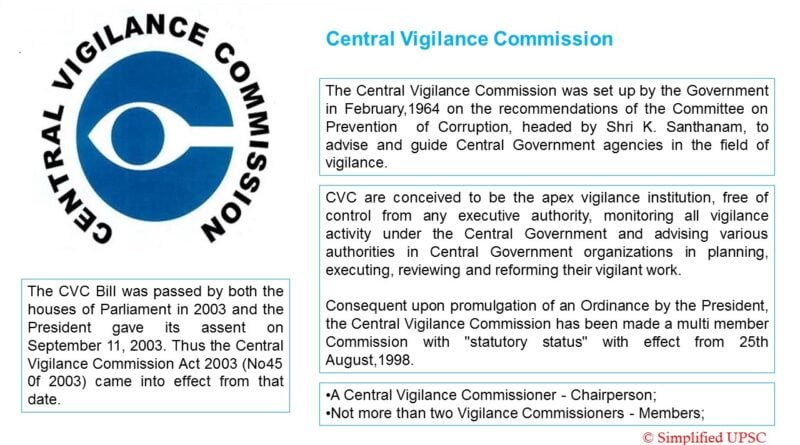Central Vigilance Commission
Context
Recently, the Central Vigilance Commission (CVC) has modified the guidelines pertaining to the transfer and posting of officials in the vigilance units of government organizations, restricting their tenure to three years at one place.
- There are 3 principal actors at the national level in the fight against corruption: the Lokpal, the CVC and the Central Bureau of Investigation (CBI).
Key Highlights
- The Guidelines:
- The tenure of personnel in a vigilance unit at one place including lower level functionaries, should be limited to three years only.
- The tenure may be extended to three more years, although at a different place of posting.
- The personnel, who have completed more than five years in vigilance units at the same place, should be shifted on top priority basis.
- After transfer from the vigilance unit, a compulsory cooling off period of three years should be observed before a person can be considered again for posting in the vigilance unit of the organisation concerned.
- The tenure of personnel in a vigilance unit at one place including lower level functionaries, should be limited to three years only.
- Reason:
- It has been observed that undue long stay of an official in such a sensitive post at one place, has the potential of developing vested interests, apart from giving rise to unnecessary complaints/allegations etc.
- To ensure transparency, objectivity, and uniformity in approach.
About CVC
- Central Vigilance Commission is conceived to be the apex vigilance institution, free of control from any executive authority, monitoring all vigilance activity under the Central Government.
- It advises various authorities in Central Government organizations in planning, executing, reviewing and reforming their vigilance work.
Background:
- The CVC was set up by the Government in February, 1964 on the recommendations of the Committee on Prevention of Corruption, headed by K. Santhanam.
- The Parliament enacted Central Vigilance Commission Act, 2003 (CVC Act) conferring statutory status on the CVC.
- It is an independent body which is only responsible to the Parliament.
- It submits its report to the President of India.
Functions:
- Exercise superintendence over the functioning of the Delhi Special Police Establishment (CBI) insofar as it relates to the investigation of offences under the Prevention of Corruption Act, 1988.
- The CVC receives complaints on corruption or misuse of office and recommends appropriate action.
- Following institutions, bodies, or a person can approach CVC: Central government, Lokpal and Whistle blowers.
- CVC has no investigation wing of its own as it depends on the CBI and the Chief Vigilance Officers (CVO) of central organizations, while CBI has its own investigation wing drawing its powers from Delhi Special Police Establishment Act, 1946.
Composition:
- It is a multi-member Commission consisting of a Central Vigilance Commissioner (Chairperson) and not more than 2 Vigilance Commissioners (Member).
Appointment of Commissioners:
- They are appointed by the President of India on the recommendations of a committee consisting of Prime Minister, Union Home Minister and Leader of the Opposition in Lok Sabha (if there is no Leader of Opposition then the leader of the single largest Opposition party in the Lok Sabha).
Term:
- Their term is 4 years or 65 years, whichever is earlier.
Removal:
- Removal is done by the President on grounds of bankruptcy, unsound mind, infirmity of body or mind, sentenced to imprisonment for a crime, or engages in paid employment or has acquired financial or other interest that might affect his judgment.
- He can also be removed for proved misbehaviour or incapacity if the Supreme Court inquiry finds him guilty.
- They can also resign by writing to the President.
Source: The Hindu
Discover more from Simplified UPSC
Subscribe to get the latest posts sent to your email.



